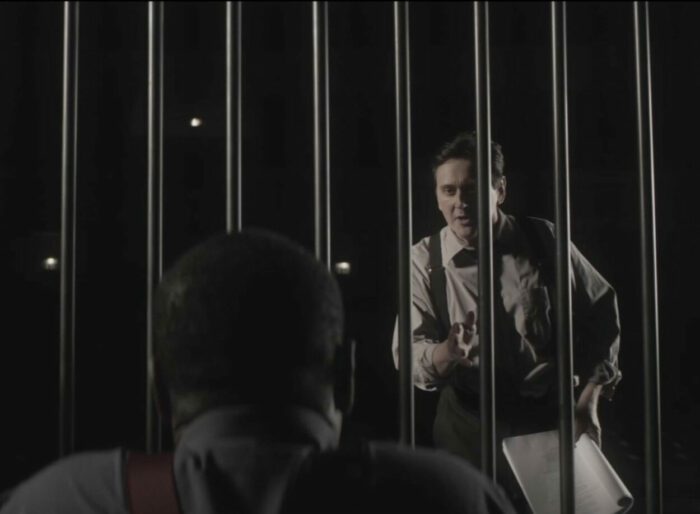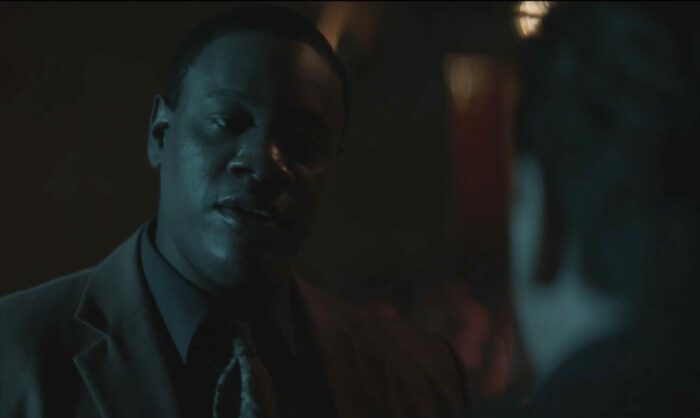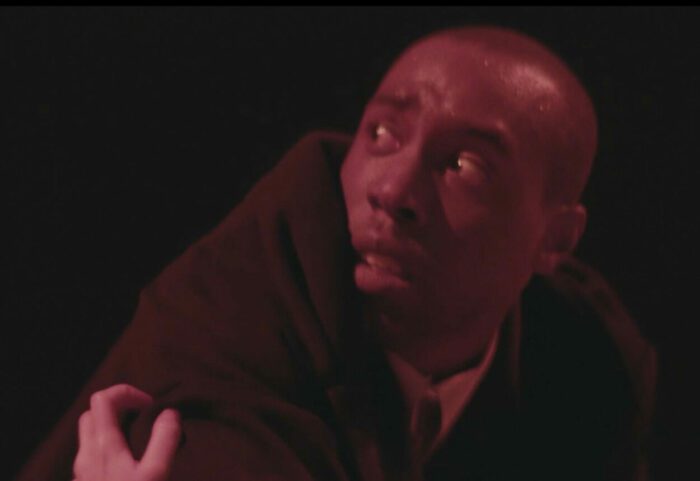The Problem of the Hero, a new film from Why Not? Productions, explores a significant moment in American literature and theater. It was a moment when two important figures collided, their contrasting experiences and ideals informing a contentious debate about single page of script that would serve as synecdoche for race relations both then—in 1941—and today. Novelist Richard Wright, played by J. Mardrice Henderson, had enlisted the help of Pulitzer Prizewinning playwright Paul Green, played by David zum Brunnen, to adapt his book Native Son to the stage.

But adapting Native Son would not prove easy, even with the contributions of legendary Mercury Theater producers John Houseman and Orson Welles and ex-boxer Canada Lee in the lead. Its last act would need to be rewritten. Wright, a communist who had experienced racial injustice firsthand, felt Green, a WWI veteran invested in the promise of racial equality, had missed the mark with his script. As their play’s opening night approaches, The Problem of the Hero dramatizes a spirited debate between the two, one that extends beyond the words on the page and the performers on the stage to broader issues of racial inequity and social justice.
As The Problem of the Hero continues its festival run, Executive Producer and co-lead actor David zum Brunnen spoke to Film Obsessive’s Executive Editor J Paul Johnson to discuss the film’s origins, production, and distribution. The interview has been edited for space and clarity; scroll below for the full video.
Film Obsessive: For those of you who have yet to see The Problem of the Hero, what can viewers expect?
David zum Brunnen: Paul, thank you very much for having me and I’ll try to speak as best I can on behalf of the entire team. The Problem of the Hero is a film adaptation of a stage play called Native, which is based on the true-to-life events where Richard Wright, the groundbreaking African American novelist, and Paul Green, who was a Pulitzer Prize-winning playwright from North Carolina for Abraham’s Bosom, actually partnered per Richard’s request on creating Wright’s novel, Native Son, for the Broadway stage.
As that brief description may sound, at times the most compelling parts of this film and this story are really the experiences that these two men faced as their friendship developed in developing the stage play. Race, social strata, class, socioeconomic position, personal agency, politics, a variety of personal experience—they both brought very different perspectives to the play. And that led to substantial conflict in the friendship that had developed. I’m afraid to get into too much more because it might be a bit of a spoiler, but what you can expect is what has been called a passionate and crisp exchange of personal opinion and beliefs that resonates pretty strongly, we believe, with the world we live in today.
You play the Pulitzer Prize winning playwright Paul Green in the film, and you did on the stage as well (in the play Native). Were you originally involved in that production as a producer? At what point was the decision made to take this, your play, if you will, from the stage to the screen?
My wife Serena (Ebhardt) and I are producers of the theatrical outfit [EbzB Productions] that has toured nationally with a variety of productions usually rooted in either commissions or requests for us to adapt true-to-life events or historical events that may have some resonance in today’s world. We began discussions with the Paul Green Foundation over ten years ago, well over a decade ago, about expanding awareness of Green. He was very much a social justice advocate, particularly here in the Southeast. Increasing awareness of Paul Green’s life and his work evolved into the story we have today. Serena and I have developed works that we oftentimes have taken on the roles ourselves. As the piece evolved, it became apparent that it would probably be best that I take on the role [of Green], and the gentleman you see playing Richard Wright, J. Mardrice Henderson [in The Problem of the Hero], actually took on the stage role himself. So in some ways it was like us wearing very comfortable clothing and working together on the film as well.

In what ways was the similar or different from your performance on the stage?
The film is different from the play. In fact, those who see the film may view it as rather intense in some of the discussions in the exchange that occur between Paul Green and Richard Wright. But the play itself is centered strictly within the confines of a room at the Hotel Bristol in New York City, where they met once or twice prior to the opening of the Broadway adaptation and its opening. [In the film] This is expanded into a theater.
This is our first attempt at a feature film. Thank goodness that we chose the director of photography, Steve Milligan, and the director, Sean Dozier. They really helped guide us in our usual exercise and punching above our weight in taking on this project, particularly the film project. It was a steep learning curve. We very quickly had to learn that film is very different than broadcast. They [Milligan and Dozier] were guiding us throughout the whole way, to their credit. Along with Allana Johnson, the producer, they helped develop a sense of ensemble that would exist in a theatrical production. And it’s evident, I think, not only in the product, but also in the response that the film is getting as well.
I imagine there’s a degree of comfort in knowing that the two leads have already performed these roles to a degree of success and satisfaction as well. But you both are performing roles of actual historical persons. I’m a little bit more familiar with the story of Richard Wright than I am of Paul Green. What research do you do personally, and what obligations do you have to the historical record as you prepare and perform?
Here in North Carolina, it’s hard to escape being exposed to Paul Green’s work. His work is prolific in this state: his social justice advocacy, particularly his efforts to address inequities in our justice system here in the country, particularly in North Carolina and the South generally. So it’s hard to avoid being exposed to him and his life’s work. And I grew up in a household that truly relished and embraced history. Studying history, I’ve known about Paul Green since my very young years and read a great deal of his work. I think it’s incumbent upon us to present and represent and portray as genuinely as possible these people that we are imbuing in our efforts, not only on the stage but in film.
But that also entails sometimes exploring uncomfortable truths that are universal in human nature, whether it be emotion, whether it be personal belief, whether it be failures and mistakes in life. It is incumbent upon us to recognize those genuinely as well. All of those factors, I think, are ones that we tried to address in this film. Not only in the creation of the film, but in the writing that James Hodge did and that [Ian] Finley did in adapting this from the stage play.

It’s interesting to me that although you were both playing persons whose lives are well documented in the historical record, the film is limited to the work that takes place on a single evening as the play Native Son is being prepared along with Canada Lee, John Houseman, and Orson Welles, and others for its stage debut. Is that a play you’ve ever seen? I know it’s available to read. It occasionally gets performed still once in a while in a revival.
The book and the play I’ve read many times, and I’ve seen excerpts of certain footage of plays that had been done in the 20th century and in the 21st century. You brought up such an important point. It’s come up in audience discussions and questions that we’ve gotten from journalists, reviewers, and critics such as yourself. This is one brief episode in these two men’s lives. I think it’s important to recognize that these two men lived incredibly active lives. That had such an impact on all of us today that we don’t recognize or that, that we’re not aware of. But this is one episode in two very productive active lives. Not only in the the cultural arts, the theatrical arts, and the literary arts, but also in social justice advocacy and political advocacy and not just domestically, but globally.
And I hope one of the drivers of creating this film and this story, and the stage play as well, is that it allows people to become aware and be introduced to these two men. And hopefully they’ll be encouraged to research much more about them beyond just this particular experience that these two gentlemen had for a brief amount of time in their lives. I apologize for going off a bit, but it’s such an important point and it’s come up often in our audience discussions after screenings.
I’m absolutely aligned with you there, David. Native Son is a book that I taught many times during my career as a literature and film professor. I don’t think it’s taught as frequently in the curriculum or regarded as canonical as it had been a generation or two before. I’d asked about the play adaptation which took place really not long after Wright had finished the book. Is there much of that play viewers can expect to see when they watch The Problem of the Hero? Or is the conversation between the debate between Wright and Green really at center stage here?
The exploration of these two men’s backgrounds in their personal interaction with one another is the focus, that and the personal experience they bring to it. That’s really the crux of this film story, we believe. What has happened and what happens again at the audience screenings and what was happening while we created the stage play and even what has happened as we created the film on the set—people would come in for a day at a time and then be gone, or people would be there throughout—the same conversations that are happening in this film in Ian Finley and James Hodges’ screenplay were mirrored in the conversations that were happening off camera on the set and in the audience responses to the screenings.
Those excerpts of the play that do indeed appear in the film and in the stage play, if very briefly, stir the pot even more. I think it allows us to contextualize the play Native Son and the play Native when they occurred 80 years apart and now the film 80 years afterwards. The conversations that occur are due not only to the stage play Native, but to the book [Native Son] and the content that appears in the film, but also in the play that is actually for which the film is entitled, The Problem of the Hero, which has never been published by the way. It is a small play by Richard Wright which was never published, which can be found in the Beinecke [Rare Book & Manuscript] Library at Yale.
If people really want to dig, you have to dig to find it. [So our film] is not only based on the book [Native Son] and the play Native, but also The Problem of the Hero by Richard Wright himself, which is also appears in the film.
We’re talking about events that first occurred right around 1940 and then 1941 when Wright and Green were discussing the ending of the play that would pose the debate between the two of them. But you’re absolutely right: the issues they were discussing and that were important to each man are still with us today. Do you find yourself, having played Paul Green, more aligned with his perspective than that of Richard Wright?
Oh boy! You have chosen a really hot button topic for a lot of people right there!
I’ve had to say this often. In fact, all of us who have been involved with the production of the stage play and the film say often, and I don’t think it’s disingenuous to say this, I think it’s being just very candid and honest: we’re still processing this ourselves, and even at the film festivals with critics, we’re still processing.
I will say to everyone who will hear me, I hold Paul Green in such great admiration for his life’s work. I aspire to be the kind of man he was in his social justice advocacy. I will say that this experience, and it’s been documented many times in interviews, and I think we allude to it briefly at the very end of the film (not too much of spoiler alert there), but Paul Green reflected—he rued, I guess I could say, he regretted some of his behavior in this instance and reflected on it for decades, almost to his dying day. And that’s documented in correspondence and interviews.
Again, I come back to this is one brief episode in these men’s experiences. All that is to say is as Ian Finley, who wrote the stage play and contributed to some of the screenplay, said: they’re both right in their own way. They’re both right and that’s what’s so troubling and so difficult to grasp for us seeing this unfold is that they both have viable viewpoints and perspectives on this. As much as we may disagree with either one, but they both have some viable perspectives on this.
I think it’s important for us to view it as they both have something to say that’s worth listening to, as opposed to pointing and saying, well that’s wrong. Or pointing at how wrong they can be, both of them at any given time. And in some cases, Paul [Green] in this particular piece. But he is somebody who, overall in life, I aspire to him in many ways. Yes, I have an affinity for some of his viewpoints, but at the same time, I’ve drawn gasps at some audiences responses when I say, who could blame Richard [Wright] for having some of the perspectives that he has? People are still trying to understand some of Richard’s viewpoint in this.
It’s clear to me that neither [Green nor Wright] could really, fully have or own the perspective of the other, and the best they could do was to strive to understand the other’s. I do think the film draws them toward each other. Even at the end, the show must go on. There’s a decision to be made, a play to be performed. A play that was, by all measures, quite successful for reviewers of its time. I wish I had seen it back then.
The set changes would have taken a really long time! Just so you know!
David, thank you so much for joining us here at Film Obsessive today. I want to ask where and when can viewers next see The Problem of the Hero?
We will screen at the Naples International Film Festival next week, end of October. We’re at the St. Louis International Film Festival in November. We are pleased to be there as well. There are some upcoming possibilities that we are not ready to announce yet, and we are most certainly in conversation with distributors at this time. But again, those are things that we are not ready to go deeper into in revealing more information. But stay tuned. I can assure you it will be it will be out there for folks to enjoy.
Thank you again, David. I appreciate your time and best of luck with the festival run and hopefully with the theatrical distribution as well for The Problem of the Hero.
Paul, thank you so much for having me. We appreciate it, all of us do.




